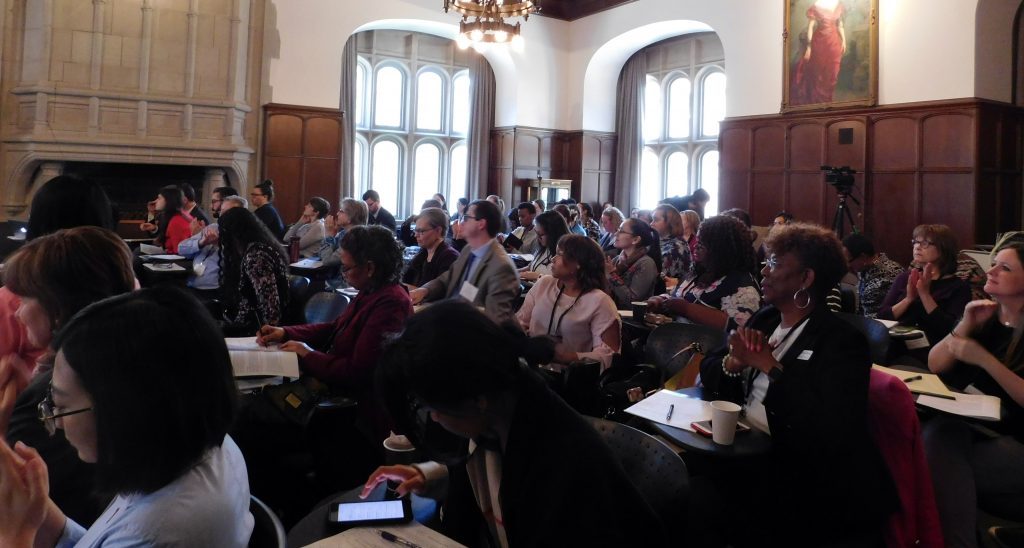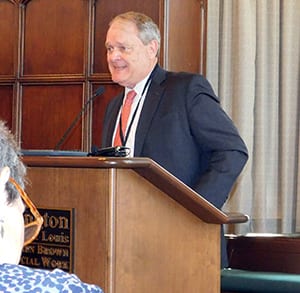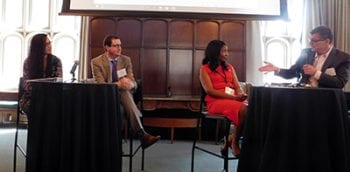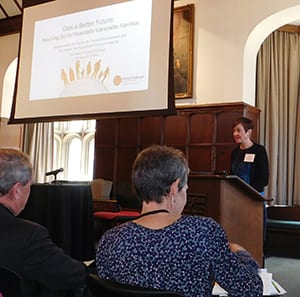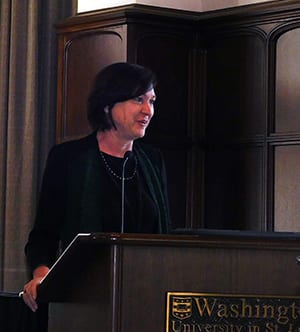To celebrate Financial Capability Month, the Center for Social Development and the Center for Household Financial Stability at the St. Louis Federal Reserve convened a forum, “Coin a Better Future: Reaching Out to Financially Vulnerable Families.”
About 100 researchers, practitioners, policymakers and students registered for the April 17 event at the George Warren Brown School of Social Work.
Keynote speakers were Ted Beck, president and CEO of the National Endowment for Financial Education (NEFE), Mae Watson Grote, founder and CEO of The Financial Clinic, and Darla Spence Coffey, president and CEO of the Council on Social Work Education (CSWE).
The event also featured panels on policy and practice innovations, and preparing human service practitioners for Financial Capability and Asset Building (FCAB) practice. The new textbook “Financial Capability and Asset Building in Vulnerable Households” also was introduced.
Financial capability is a shared experience and responsibility, Beck said. Schools and city and state government aren’t going to resolve the matter. “Everybody has to contribute,” he said.
NEFE-funded research at the Center for Social Development investigated how much financial education is currently taught to train social workers around the country, and which financial topics social workers believe would benefit them most. Ninety-one percent of faculty respondents agreed with the statement that “students would benefit from more financial or economic content than is currently being taught.” (See CSD’s full research report here.)
Grote pointed out that 1.8 million workers are on the frontlines of antipoverty work, according to the U.S. Department of Labor.
“My vision is that every one of them have a financial security tool, product or practice in their arsenal that informs their unique mission and meets their customers where they are,” Grote said. Based in New York City, The Financial Clinic’s mission is to build working poor people’s financial security.
Grote said her faith in the power of financial coaching was affirmed in 2015 with a randomized control trial that measured the effects of financial coaching for low- to moderate-income families. The evaluation found that customers with annual incomes of $22,000 who participated in financial coaching achieved an average of $1,700 more in savings, a 33-point increase in their credit score, and more than $1,000 in debt reduction.
The evaluation also found significantly higher confidence levels when study participants were asked about the prospect of reaching their financial goals, Grote said. “This gets at the heart of why we do what we do, and why we’re so passionate about its value in today’s discourse on poverty alleviation.” (See “The Pivotal Role of Human Service Practitioners in Building Financial Capability.”)
Coffey, whose organization represents more than 750 accredited undergraduate and graduate programs of professional social work, said social work has a role to play in fostering financial capability.
“The need for financial capability manifests itself throughout our work,” she said.
“It’s not just in the requests of clients who have explicitly identified the need for financial coaching or financial planning. Social workers find the same need among families in the child welfare system and those represented by children in schools. They find it among families represented in the justice system. Social workers are in every sector of society.”
FCAB content and skill building should be in “the generalist foundation of social work education—in the BSW and MSW foundations—not just as an optional area of specialized practice,” she said. (See “Next Steps: Whither Social Work Education and Financial Capability and Asset Building?”)
“Build financial capability for all” is one of the 12 national Grand Challenges for Social Work.
